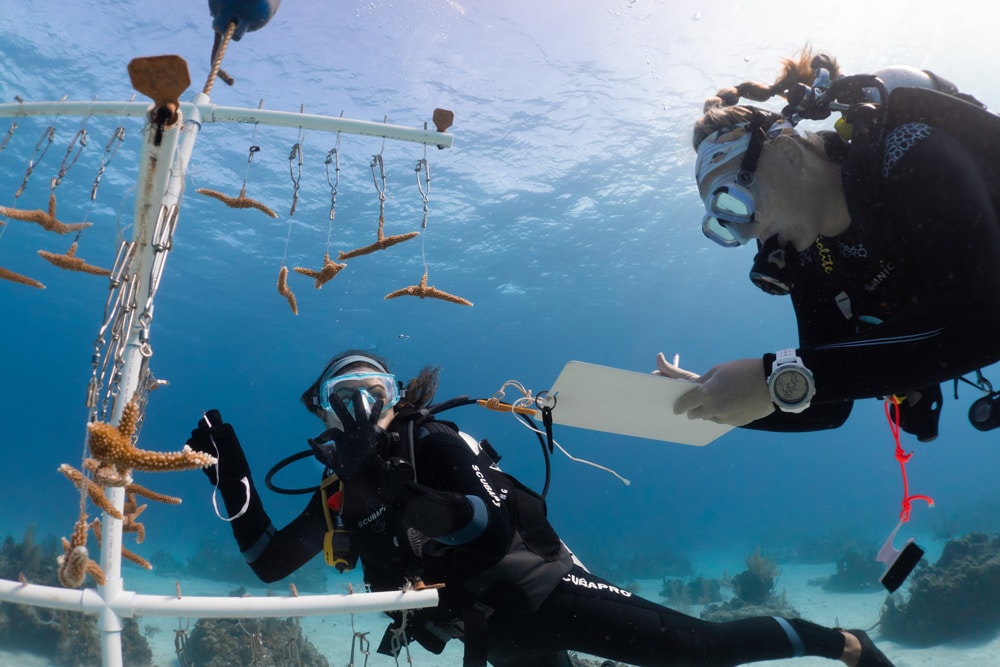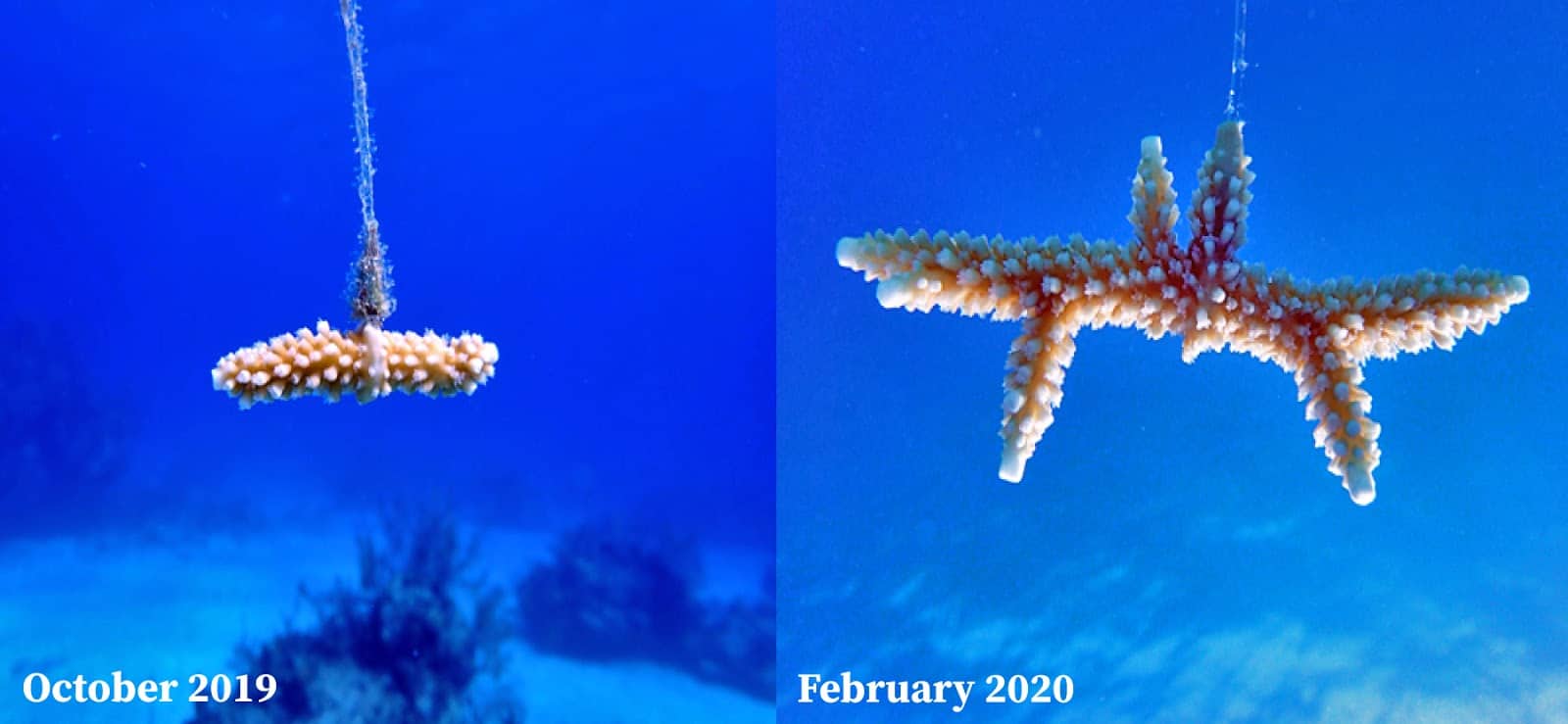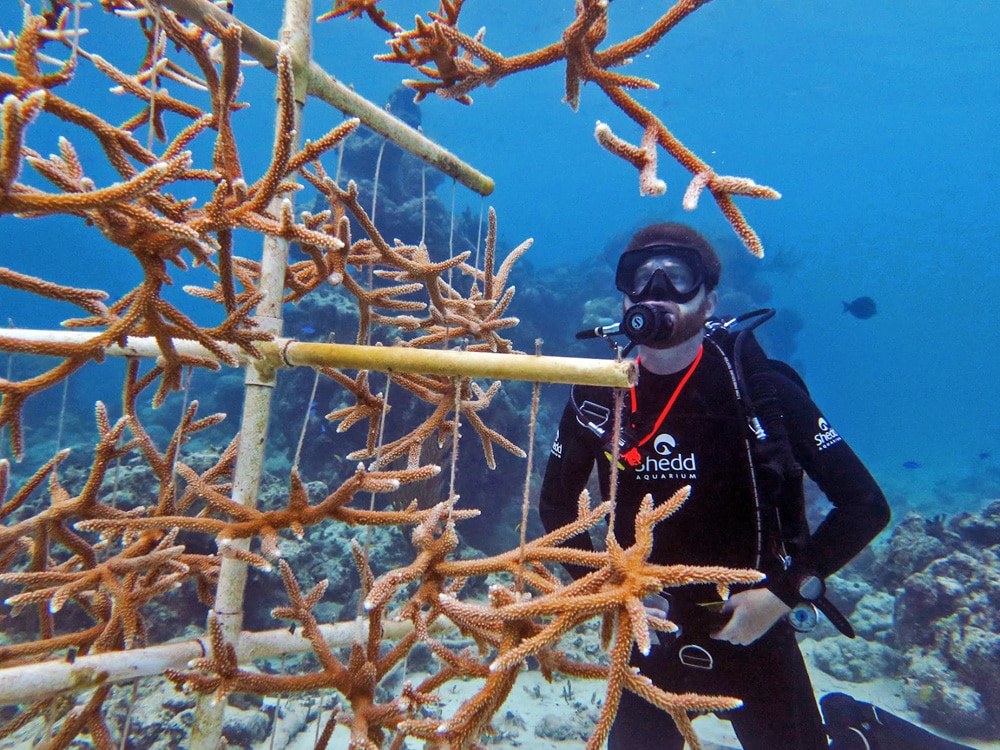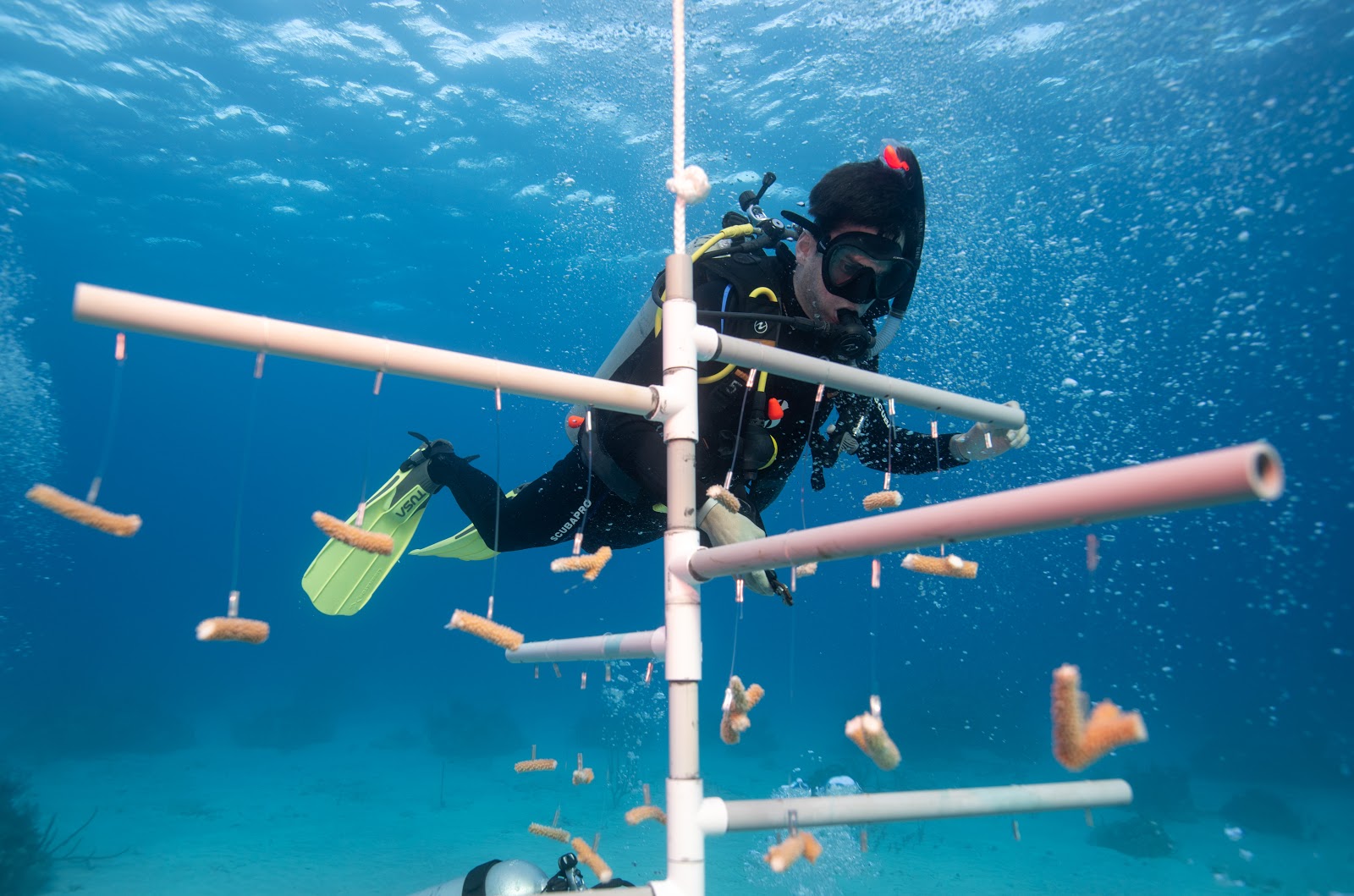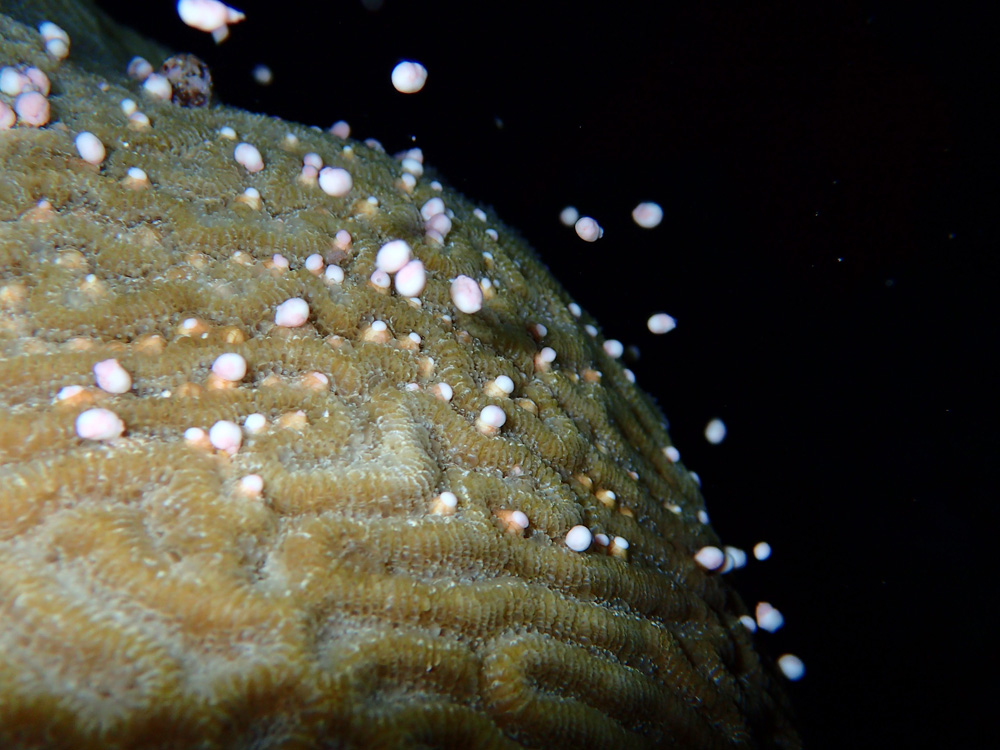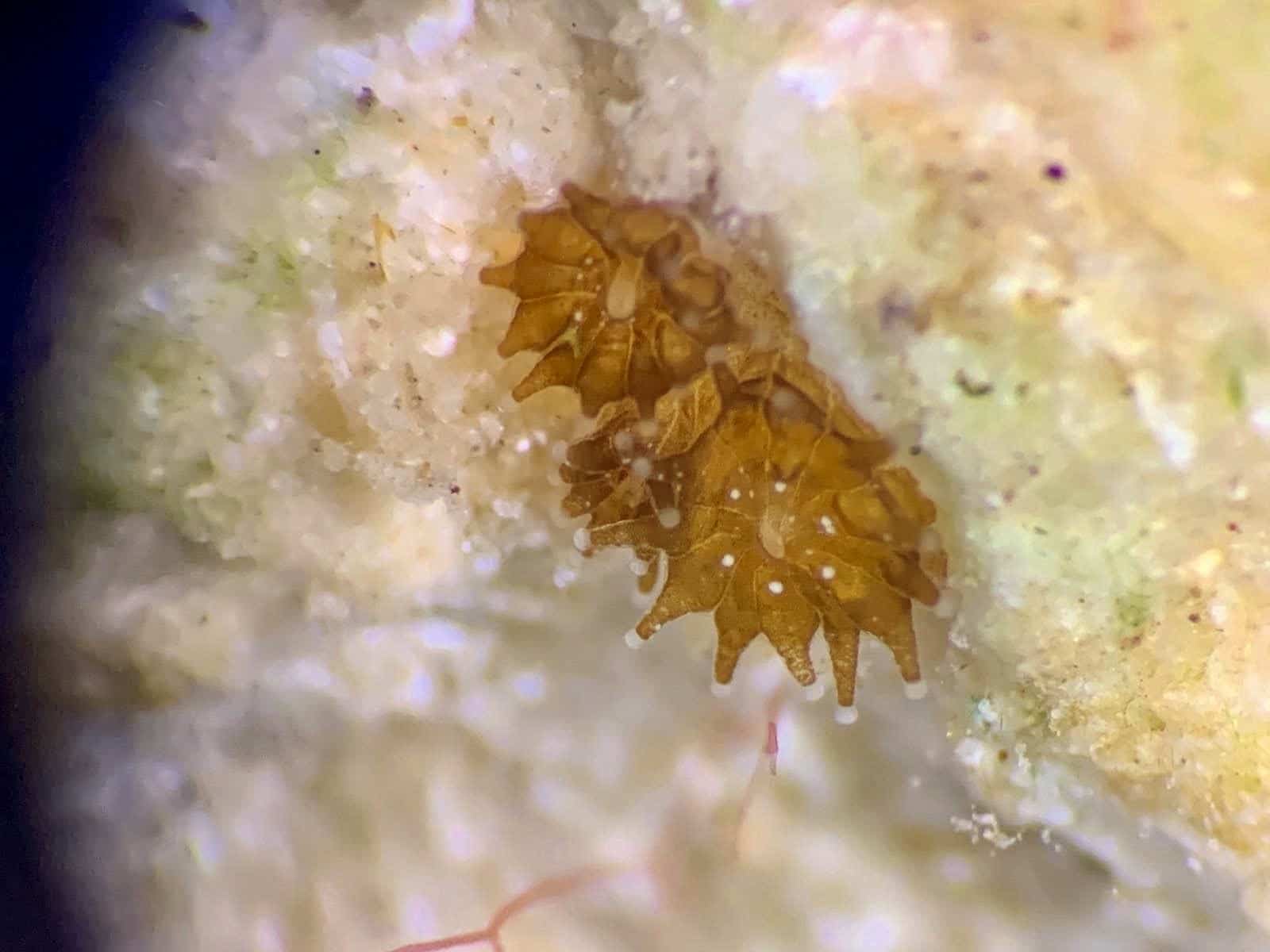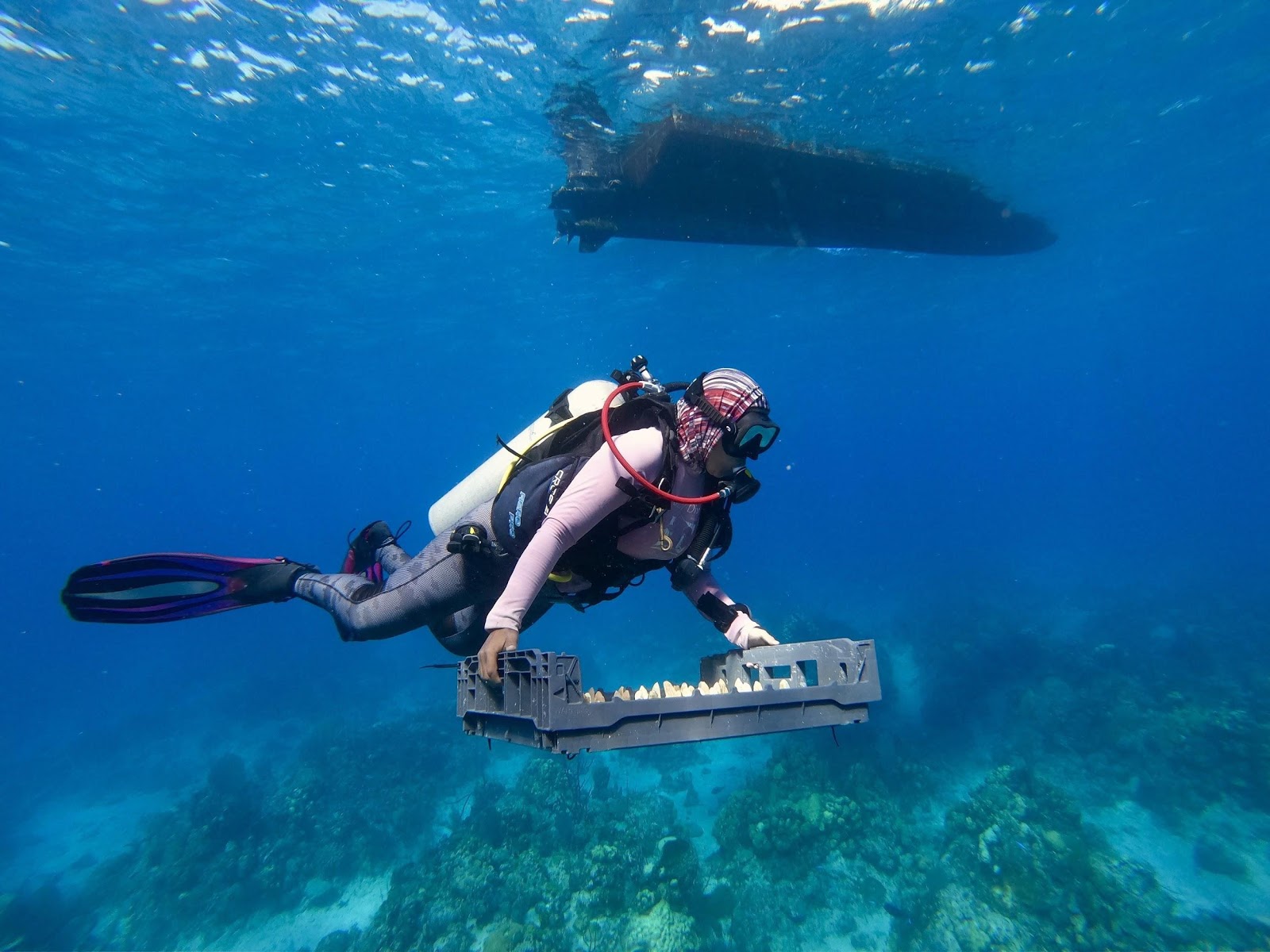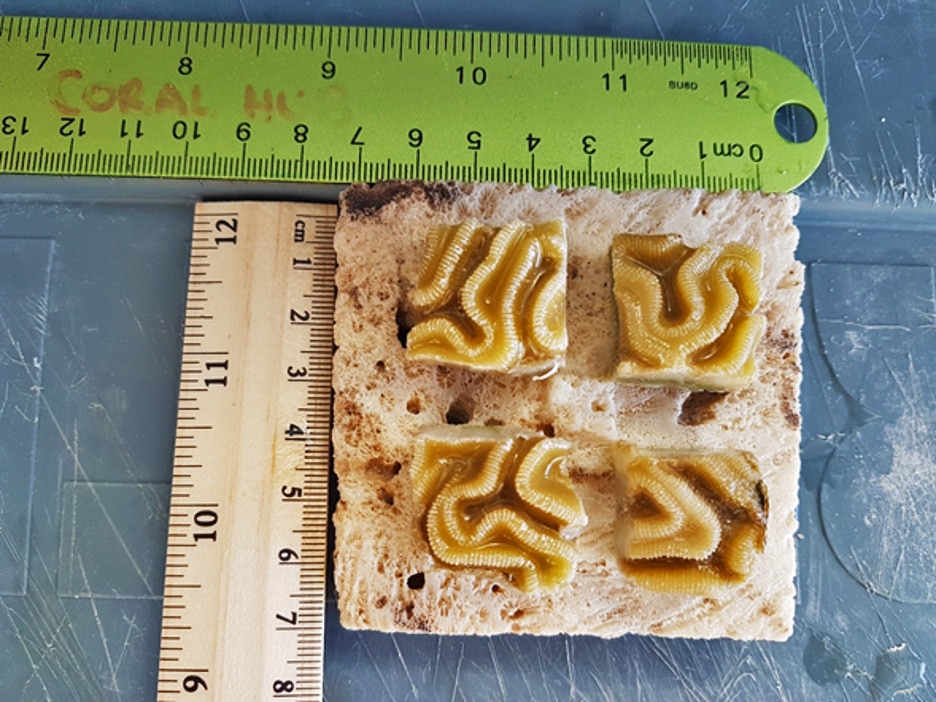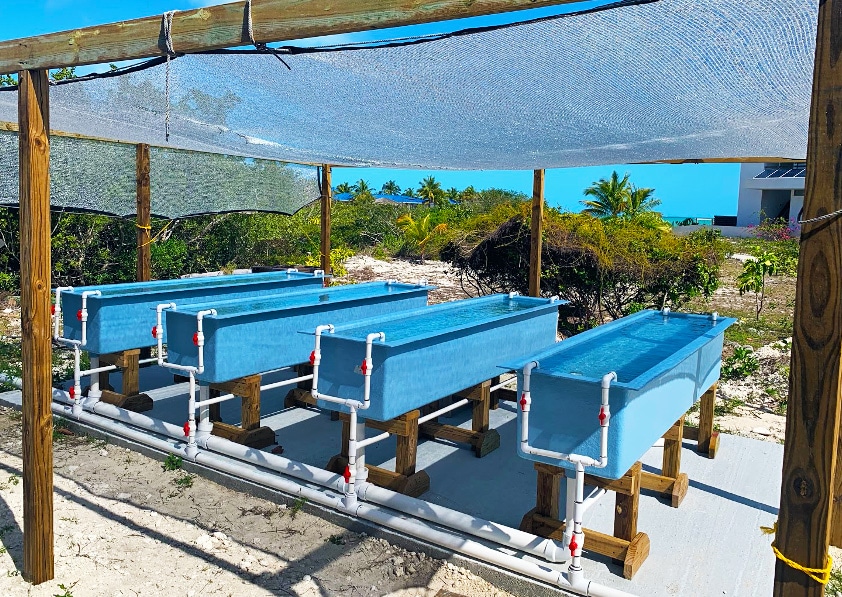Marine Life & Conservation
Reversing the decline of Bahamian reefs
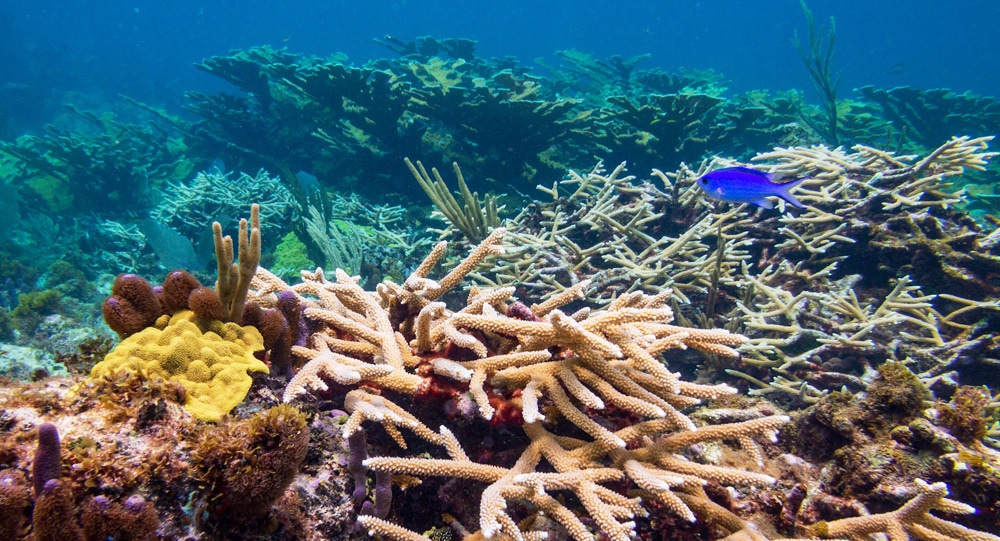
I recently got in touch with the Cape Eleuthera Institute in The Bahamas to ask about their work on coral reef conservation. I was delighted to “meet” Natalia Hurtado, MSc., Coral Reef Research Associate at PIMS/CEI & Casey Harris, MSc., Coral Reef Research Associate at PIMS/CEI. THis is what they had to say about their important work.
Much like coral reefs worldwide, coral populations in The Bahamas are declining at alarming rates, making coral restoration more vital to preserve marine resources and local economies. The Bahamas Coral Innovation Hub located in Eleuthera, The Bahamas is a collaboration between the Cape Eleuthera Institute (CEI), Perry Institute for Marine Science (PIMS), and The Nature Conservancy (TNC). With our work, we hope to facilitate the recovery of degraded Bahamian reefs and enhance coral population resilience.
One major problem facing coral reefs worldwide is that coral abundance is decreasing due to both local and global threats, making it difficult for corals to maintain genetic diversity on the reef. At the same time, their ecosystem services are deteriorating, affecting human livelihoods and the diversity of marine species that rely on them. At the Coral Innovation Hub, we focus our restoration efforts on 3 main areas of research: nursery-reared coral fragments, larval propagation, and coral microfragmentation. We are also dedicated to student involvement in our research, with the goal of inspiring younger generations to pursue careers in marine conservation. All projects at the Coral Innovation Hub are led by Natalia and Casey.
Nursery Establishment to Improve Genetic Diversity
Corals can reproduce asexually, in which they undergo a strategic life-history trait called “fragmentation”, where pieces of coral can break off from disturbance and then attach to the substrate to form a whole new colony. We can take advantage of this natural process to grow corals at a much faster rate and plant them back on degraded reefs. We do this by growing corals in a mid-water tree structure, which is made with PVC and tethered to the sea floor, where corals are suspended away from sediment and predators. Below is a picture of Researcher Casey Harris taking notes of coral sizes while an assistant is taking measurements.
The establishment of coral nurseries is an important step to keep coral fragments safe while they grow. Caribbean branching corals grow extremely fast and increase in size about 10-20 cm (4-9 in) per year compared to large boulder species, which only grow about 1-2 cm (<1 in) per year. This is great for restoration efforts because after one year of growing in the nursery, branching corals can be outplanted back on the reef.
We are currently running a project with Dr. Ross Cunning (pictured below) at Shedd aquarium and the Reef Rescue Network, where we are investigating the resilience of staghorn corals by spreading different genotypes across The Bahamas to increase genetic diversity within coral nurseries. We have 19 staghorn genotypes that were collected and moved between existing nurseries and wild populations throughout a few Bahamian Islands in October 2019. Increasing genetic diversity within coral nursery projects is important because some genetically distinct individuals may be better suited to withstand environmental stress than others. Having as many different genotypes as possible is essential to successful restoration outcomes.
During a 15-day expedition onboard the Shedd Aquarium research vessel R/V Coral Reef II, 570 staghorn corals were distributed between newly established nurseries located in Bimini, Nassau, Cat Island, and Eleuthera. In each location, coral growth has been monitored by our partners and they are thriving in their new locations.
Student Involvement as Reef Rescue Divers
The Coral Innovation Hub at CEI works closely with Island School students and visiting educational groups from different ages and backgrounds. These students have a unique opportunity to complete a PADI Reef Rescue Diver Specialty Course. This course was developed by Hayley-Jo Carr, Training Director & Coordinator of the Reef Rescue Network, and Dr. Craig Dahlgren, Executive Director of PIMS. The Reef Rescue Diver Specialty and Reef Rescue Network were both created by PIMS, with the goal of rehabilitating coral reefs by working with various partners to establish a network of coral nurseries around The Bahamas and other parts of the Caribbean.
During the course, students learn about the value of coral reefs and restoration, different types of nurseries, how to maintain nurseries, coral fragmentation, outplanting and monitoring. They work with Critically Endangered species, such as elkhorn and staghorn coral, that were once abundant on Caribbean reefs but have rapidly declined since the 1980s. We target these species for restoration because they play an important ecological role on the reef by providing high rugosity and three-dimensional functionality that protects our shorelines and provides shelter for marine life.
Implementing Larval Propagation as a Restoration Technique
Corals can also reproduce sexually. In sexual reproduction, corals release “spawn” (egg and sperm) and can synchronize their spawning events with colonies of the same species. Pictured below are the gamete bundles of a brain coral, in which the coral releases both egg and sperm (male and female gametes). We can take advantage of these spawning events to collect their spawn and cross fertilize them to increase genetic diversity, and study the vulnerable early life-history stages of corals.
During summer 2019, Coral Innovation Hub researchers collected coral gametes and saw high rates of fertilization and settlement success, with over 5,000 Orbicella faveolata (mountainous star coral) recruits (coral babies pictured below) settled on SECORE Seeding Units (concrete and ceramic substrates).
We are allowing juvenile corals to grow in an offshore nursery tree and outplanted more than 1,000 substrates with coral recruits onto the reef. The goal is to determine if initial and long-term coral survivorship is possible in an offshore nursery and/or on the reef. This research was conducted during SECORE’s International Coral Spawning and Propagation Workshop hosted at CEI with PIMS and TNC. Below is a picture of Researcher Natalia Hurtado carrying substrates to be outplanted on the reef.
A New Restoration Technique for Boulder Corals
Another way to grow corals through asexual reproduction is by using a new restoration technique for slow-growing boulder species called “microfragmentation,” founded by Dr. David Vaughan, Plant a Million Corals. This process consists of cutting fragments of the same colony into small pieces (1-3 cm, pictured below), using a specialized saw. The clone fragments will recognize each other and fuse together, growing 25-50 times faster than normal.
At the Coral Innovation Hub, we plan to run pilot experiments on different coral species to document the most successful microfragmentation methods needed to upscale our efforts. As part of our study, we will examine the survivorship and growth of microfragmented boulder corals (brain corals, star corals, etc.) in our land-based wetlab facility (pictured below). If proven successful, we will grow boulder corals in an offshore table nursery or directly outplant microfragments to the reef.
Want to know more about Reef Rescue Network? Please contact Hayley-Jo Carr. If you have any questions or want to get involved with The Bahamas Coral Innovation Hub project, please contact Natalia Hurtado or Casey Harris.
Marine Life & Conservation
Double Bubble for Basking Sharks

 The Shark Trust is excited to announce that, for two more days only, all donations, large or small, will be doubled in the Big Give Green Match Fund!
The Shark Trust is excited to announce that, for two more days only, all donations, large or small, will be doubled in the Big Give Green Match Fund!
Donate to Basking in Nature: Sighting Giants
The Shark Trust is hoping to raise £10k which will be doubled to £20k. This will go towards Basking in Nature: Sighting Giants. And they need YOUR help to reach they’re goal.
The Shark Trust’s citizen science project is to monitor and assess basking sharks through sightings; encouraging data collection, community engagement, and promoting nature accessibility. This initiative aims to enhance health and wellbeing by fostering a deeper connection with British Sharks.
Campaign Aims
- Increase citizen science reporting of Basking Sharks and other shark sightings to help inform shark and ray conservation.
- Provide educational talks about the diverse range of sharks and rays in British waters and accessible identification guides!
- Create engaging and fun information panels on how to ID the amazing sharks and rays we have on our doorstep! These can be used on coastal paths around the Southwest. With activities and information on how you can make a difference for sharks and rays!
- Promote mental wellbeing through increasing time in nature and discovering the wonders beneath the waves!
Donate, and double your impact. Click Here
Marine Life & Conservation
Leading UK-based shark conservation charity, the Shark Trust, is delighted to announce tour operator Diverse Travel as a Corporate Patron

 Corporate Patrons provide a valuable boost to the work of The Shark Trust. The Trust team works globally to safeguard the future of sharks, and their close cousins, the skates and rays, engaging with a global network of scientists, policymakers, conservation professionals, businesses and supporters to further shark conservation.
Corporate Patrons provide a valuable boost to the work of The Shark Trust. The Trust team works globally to safeguard the future of sharks, and their close cousins, the skates and rays, engaging with a global network of scientists, policymakers, conservation professionals, businesses and supporters to further shark conservation.
Specialist tour operator Diverse Travel has operated since 2014 and is committed to offering its guests high quality, sustainable scuba diving holidays worldwide. Working together with the Shark Trust will enable both organisations to widen engagement and encourage divers and snorkellers to actively get involved in shark conservation.
“Sharks are truly at the heart of every diver and at Diverse Travel, we absolutely share that passion. There is nothing like seeing a shark in the wild – it’s a moment that stays with you forever!” says Holly Bredin, Sales & Marketing Manager, Diverse Travel.
“We’re delighted to celebrate our 10th year of business by becoming a Corporate Patron of the Shark Trust. This is an exciting partnership for Diverse and our guests. We will be donating on behalf of every person who books a holiday with us to contribute towards their vital shark conservation initiatives around the world. We will also be working together with the Trust to inspire divers, snorkellers and other travellers to take an active role – at home and abroad – in citizen science projects and other activities.”
Paul Cox, CEO of The Shark Trust, said:
“It’s an exciting partnership and we’re thrilled to be working with Diverse Travel to enable more divers and travellers to get involved with sharks and shark conservation. Sharks face considerable conservation challenges but, through collaboration and collective action, we can secure a brighter future for sharks and their ocean home. This new partnership takes us one more valuable step towards that goal.”
For more information about the Shark Trust visit their website here.
For more about Diverse Travel click here.
-

 News3 months ago
News3 months agoHone your underwater photography skills with Alphamarine Photography at Red Sea Diving Safari in March
-

 News2 months ago
News2 months agoCapturing Critters in Lembeh Underwater Photography Workshop 2024: Event Roundup
-

 Marine Life & Conservation Blogs2 months ago
Marine Life & Conservation Blogs2 months agoCreature Feature: Swell Sharks
-

 Blogs2 months ago
Blogs2 months agoMurex Resorts: Passport to Paradise!
-

 Blogs2 months ago
Blogs2 months agoDiver Discovering Whale Skeletons Beneath Ice Judged World’s Best Underwater Photograph
-

 Gear Reviews2 months ago
Gear Reviews2 months agoGear Review: Oceanic+ Dive Housing for iPhone
-

 Marine Life & Conservation2 months ago
Marine Life & Conservation2 months agoSave the Manatee Club launches brand new webcams at Silver Springs State Park, Florida
-

 News3 months ago
News3 months agoWorld’s Best Underwater Photographers Unveil Breathtaking Images at World Shootout 2023


